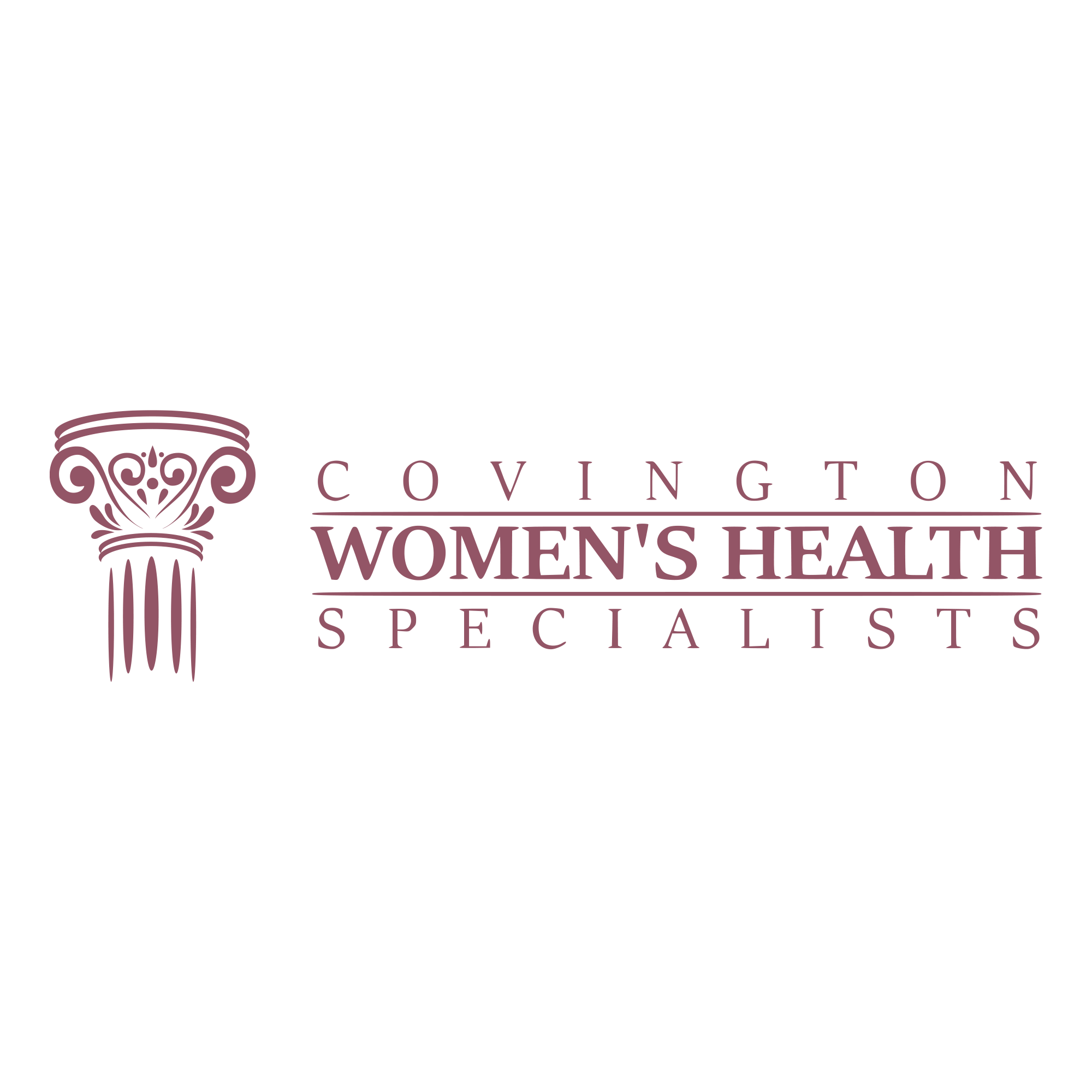Mother-of-three and local restaurant owner Sasha Stone understands the impact of creating a balance between the allure of a big city with the comforts of community. At her family’s restaurant, City Pharmacy, Sasha and her husband strive to create a place “Where Friends Meet” through a unique setting that honors the history of Covington while highlighting a unique, fresh dining experience.
When Sasha had a preference of where to deliver her third child, Birdie, it is no surprise she selected the personalized and high-quality care provided by the local birthing experts at Covington Women’s Health Specialists. Sasha’s understanding of the value of neighborhood support and community at City Pharmacy enabled her to appreciate the sincerity and compassion of Dr. Meridith Farrow, an OB/GYN with Covington Women’s Health Specialists. As a doctor and patient who both hail from Covington, their bond deepened because of their common experiences as local community members. Sasha received exceptionally attentive and individualized care from Dr. Farrow during emergency surgery and her third pregnancy. She will never forget it.
When Sasha first married, she and her husband lived close to downtown Atlanta. She became pregnant with her first baby, Moody, shortly after they had relocated back to Covington to be closer to family.
“I had been living in the city so I went to a hospital in the city to deliver my son. I thought I needed to deliver at a big, city hospital in order to be comfortable and safe,” Sasha said. “It wasn’t a bad experience, but it was definitely not a personalized or unique experience.”
As Sasha neared her due date, her doctor encouraged her to consider inducing labor. While this was not necessarily the birth plan she had in mind, she admits that she hadn’t thought too much about a birth plan so she deferred to her obstetrician.
“About an hour after they induced labor, my heart rate and my baby’s heart rate dropped,” Sasha remembers. “They changed the medication they were giving me and I went on to labor for another seven hours before my labor stalled. After 10 hours, the doctor came in to talk to me about doing a C-section.”
Before moving to a C-section, Sasha asked if she could try to deliver naturally. Her doctor agreed to let her try, but the baby’s heart rate dropped, again, and she was immediately taken into surgery.
“It moved so fast, within 15 minutes, I was in the operating room and they were delivering Moody,” Sasha said. “I was so happy that he was safe and healthy, but still a little disappointed that I wasn’t able to deliver him naturally.”
Six months after her son was born, Sasha discovered she was again pregnant. Since it was so soon after delivering Moody, she returned to her physician in Atlanta for prenatal care. However, through her work at the restaurant, Sasha had met local OB/GYN, Meridith Farrow, M.D., and they had become friends.
As it got closer to Sasha’s due date, she and Dr. Farrow discussed Sasha’s scheduled C-section and her disappointment in not being able to deliver her second son, Hyde, naturally. Dr. Farrow encouraged Sasha to talk to her physician about attempting vaginal birth after cesarean (VBAC), but when she asked her doctor about it, he told her he did not perform that type of delivery.
“I wasn’t thrilled that I was having another C-section, but I also knew that there were risks, so I didn’t push the issue,” Sasha said. “But, I do remember wondering why he wouldn’t at least take the time to talk to me about my options and what I was thinking about like Dr. Farrow was doing, and I wasn’t her patient! It was then that I finally understood what I had felt during Moody’s delivery and now this baby’s…rushed. I felt like the hospital and the doctors were on a schedule and needed to move things along to make room for the next patient. They were very kind and considerate, but there was a lack of warmth due to the rate at which they were moving me through the process.”
Local Comfort
A year and a half later, the Stones decided they wanted to add to their family. Sasha became pregnant, but within a few weeks began to have bleeding that caused her alarm. Although she and Dr. Farrow had a deep friendship, Sasha was not her patient, so she called her Atlanta doctor’s office. The doctor spoke with her over the phone and diagnosed her as having a chemical pregnancy, sometimes called an early miscarriage, which is a pregnancy where a fertilized egg does not fully implant in the uterus.
“Although I wasn’t very far along in the pregnancy, it made us sad that I had miscarried,” Sasha remembers. “But, with two boys under the age of four at home, I knew how blessed I was and that the sadness would pass.”
A week later, Sasha’s bleeding had not subsided and was continuing to worsen. She was out of town when she began to experience terrible abdominal cramps that left her unable to walk. She was finally able to reach an on-call physician with her Atlanta doctor’s office who told her to go to the closest emergency room.
Scared and in tremendous pain, she called her friend, Dr. Farrow. After speaking with Sasha and the ER physician, Dr. Farrow ordered Sasha to be transferred and admitted to our local hospital, Piedmont Newton Hospital.
Dr. Farrow quickly discovered that Sasha had an ectopic pregnancy that had ruptured and that she needed emergency surgery. Prior to going into surgery, Dr. Farrow spoke with Sasha about the risks and possible outcomes. Knowing that the Stones wanted more children, Dr. Farrow said she would do everything she could to save the ovary but that she couldn’t make promises.
“Even though I was in a situation that was serious enough to require emergency surgery, Dr. Farrow and other members of the staff took the time to talk to me, answer my questions, and make sure that I was comfortable with the plan of care,” Sasha said. “They displayed so much compassion and care for me and my husband.”
Sasha’s surgery was successful and Dr. Farrow was able to save her ovary. She recovered well and, a short time later, was able to get pregnant again. This time, there was no doubt in her mind who would be taking care of her and her baby, Dr. Farrow with Covington Women’s Health Specialists. During this pregnancy, Sasha found great comfort knowing she could rely on Dr. Farrow and have a positive birthing experience at a local hospital.
The pregnancy progressed smoothly and Sasha scheduled her C-section, but a week before she was scheduled to deliver, she began having contractions. When she got to the hospital, she told the nurses about her scheduled C-section, but she was admitted to a regular labor and delivery room until she could be examined by Dr. Farrow.
Confirming that Sasha was in active labor, Dr. Farrow asked if Sasha wanted to attempt to deliver via vaginal birth after cesarean (VBAC). She knew that Sasha had wanted to have her other children naturally, and wanted to give her the opportunity to do so safely. They agreed that Sasha would try to deliver naturally, but that Dr. Farrow would halt everything and move her to the OR if there were any issues. Fifteen minutes later, Birdie Stone, the Stone family’s third child and only daughter, was born.
“I was overcome with emotion,” Sasha said. “Our daughter was perfect and beautiful and there were no complications. Once I had time to reflect on things, I was just so grateful that Dr. Farrow approached my pregnancy and delivery with an open mind and really took the time to understand what was important to me.”
Covington Women’s Health Specialists provides the balance of high-quality clinical care with the comforts of local service.
“You think you have to go into Atlanta to have a good experience, but, in fact, by doing so you are missing out on having the best, most personal experience,” Sasha said. “There is no better care than local care and having everything you need right next door. The doctors and staff at Piedmont Newton want for you what is important to you. They want to make you feel like family.”
Are you an expecting mother looking for family-like OB/GYN care? We’re happy to help. To learn more about the Covington Women’s Health Specialists experience, please call 770-385-8954 to speak to our team, or click here.





